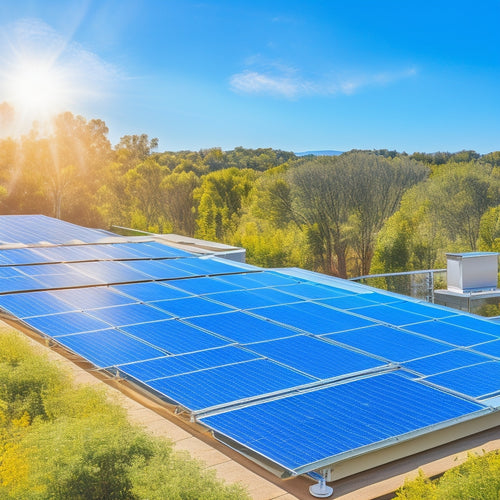
Solar Panel Kits With Battery Backup for Homes
Share
You're considering a solar panel kit with battery backup for your home, and that's a wise move, as it can provide essential power during grid outages, energy independence, and savings on your energy bills. To get started, assess your energy usage patterns, budget constraints, and system components for quality and compatibility. A typical kit includes solar panels, a charge controller, inverter/charger, and battery bank. Key installation tips include evaluating roof condition, component compatibility, and ensuring safe connections. Now that you've taken the first step, explore further to discover the perfect solar kit for your home's unique energy needs.
Key Takeaways
• Solar battery backup kits provide energy independence and backup power during grid outages, ideal for homes with essential medical equipment.
• Choose the right solar kit by assessing energy usage patterns, budget constraints, and system components for quality and compatibility.
• Key components of solar kits include solar panels, charge controllers, inverters/chargers, battery banks, and system design for safe and efficient energy storage.
• Ensure safe connections by verifying wiring meets local electrical codes, installing circuit protection, and properly grounding the system to prevent electrical shocks.
• Top brands for solar battery kits include Tesla, LG Chem, Sonnen, Generac, and SimpliPhi Power, offering a range of customizable and efficient energy storage solutions.
Benefits of Solar Battery Backup
Having a solar battery backup system installed in your home can provide you with a vital source of power during grid outages, allowing you to continue using essential appliances and devices. This means you'll have access to energy independence, even when the grid goes down.
With a solar battery backup, you can keep your lights on, your fridge running, and your medical equipment powered, ensuring your basic needs are met. This level of grid resilience is especially important for households with critical medical needs or those living in areas prone to frequent outages.
In addition to providing backup power, a solar battery system can also help you save money on your energy bills. By storing excess energy generated by your solar panels during the day, you can use it to power your home at night or during periods of low sunlight. This can greatly reduce your reliance on the grid and lower your energy costs.
Choosing the Right Solar Kit
When selecting a solar panel kit for your home, you'll need to take into account several key factors to make sure you get the right system for your needs.
You'll want to assess your energy usage patterns to determine the size of the system you require, think about your budget to decide how much you're willing to invest, and evaluate the quality and compatibility of the system's components.
Assess Your Energy Needs
You'll need to calculate your home's average daily energy consumption to determine the size of the solar panel kit required to meet your energy needs. This involves conducting an energy audit, which helps identify areas of energy inefficiency and opportunities for improvement.
A thorough home assessment will reveal your energy usage patterns, including the types of appliances and lighting you use, their wattage, and the number of hours they're used daily.
To get an accurate picture, you'll need to gather data on your energy consumption over a period of time. You can do this by reviewing your past electricity bills or using a smart plug to monitor your energy usage. Be sure to account for any energy-intensive appliances, such as refrigerators, air conditioners, and electric water heaters.
Consider Your Budget
Determining your budget is crucial in selecting a solar panel kit that meets your energy needs without breaking the bank. You'll want to take into account your financial goals and cost expectations to make sure you're getting the best value for your investment.
Here are some key factors to keep in mind when setting your budget:
-
System size and complexity: Larger systems or those with more advanced features will cost more.
-
Battery backup and storage: Adding a battery backup system will increase the overall cost.
-
Installation costs: You'll need to factor in the cost of installation, including labor and materials.
-
Inverters and charge controllers: High-efficiency inverters and charge controllers can impact the overall cost.
-
Certifications and warranties: Look for kits with certifications like UL and IEC, and take into account the length and terms of the warranty.
Evaluate System Components
What type of solar panel kit is right for your home, and how do you guarantee that each component works in harmony to meet your energy needs?
When evaluating system components, you should prioritize System Reliability and Component Durability to make sure a seamless and efficient energy supply. Assess the quality of the solar panels, inverter, charge controller, and battery bank to confirm they can withstand various environmental conditions and last for years to come.
Look for components with high-efficiency ratings, durable materials, and robust warranties. A reliable system minimizes downtime and maintenance costs, providing you with a consistent and sustainable energy supply.
Additionally, consider the compatibility and integration of each component to ensure a harmonious system operation. A well-designed system will optimize energy production, reduce energy losses, and provide a reliable backup power source during outages.
Key Components of Solar Kits
When assembling a solar panel kit for your home, it's important to understand the key components that make up the system. A well-designed solar panel kit can provide reliable energy storage and backup power during outages. To guarantee a seamless integration, you'll need to familiarize yourself with the essential components.
Here are the key components of a solar kit:
-
Solar Panels: Convert sunlight into electrical energy
-
Charge Controller: Regulates the flow of energy from the solar panels to the battery bank
-
Inverter/Charger: Converts DC power from the solar panels or battery bank to AC power for your home
-
Battery Bank: Stores excess energy generated by the solar panels for later use
-
System Design: Ensures a safe and efficient energy storage system, including Energy Storage and backup power during outages
These components work in harmony to provide a reliable and efficient energy storage system for your home. Understanding each component's role is important to guarantee a successful installation and optimal performance.
How Solar Battery Backup Works
Your solar battery backup system kicks in automatically during a power outage, providing a smooth switch to backup power and ensuring your essential appliances remain operational. This seamless switch is made possible by the advanced technology integrated into your solar panel kit. When the grid goes down, your system automatically detects the outage and switches to backup mode, ensuring you maintain energy autonomy.
Here's how your solar battery backup system works:
| Mode | Grid Status | System Response |
|---|---|---|
| Normal | Grid online | Solar power generation, battery charging |
| Outage | Grid down | Automatic switch to backup power |
| Recharge | Grid online | Battery recharge, system reset |
In backup mode, your solar panel kit's advanced inverter technology converts DC power from your solar panels and battery into AC power, providing a reliable source of energy for your home. This enhances grid resiliency, allowing you to maintain energy independence even during outages. With a solar battery backup system, you can enjoy the benefits of renewable energy while ensuring your home remains powered and connected, even when the grid is down.
Solar Panel Kit Installation Tips
When installing a solar panel kit, you'll want to start by evaluating your roof's condition to confirm it can support the weight of the panels.
Next, you'll need to select the right components, including the inverter, mounting system, and wiring, to guarantee a safe and efficient setup.
Assessing Roof Conditions
You'll need to evaluate your roof's structural integrity, age, and existing components before installing a solar panel kit to guarantee a safe and efficient installation. A thorough evaluation will help you identify potential issues that could impact the performance and longevity of your solar panel system.
Here are some key factors to take into account when evaluating your roof's condition:
-
Roof Age: How old is your roof? If it's nearing the end of its lifespan, it may be wise to replace it before installing solar panels.
-
Structural Integrity: Is your roof strong enough to support the weight of the solar panels and withstand various weather conditions? Can your roof accommodate the additional weight and wind resistance of the solar panels? Are there any signs of wear and tear, such as cracks, rust, or damaged flashing?
-
Are there any obstructions, such as skylights, vents, or chimneys, that could interfere with the installation?
Choosing Right Components
By selecting the correct components, you can ensure a smooth installation and peak performance of your solar panel kit. When choosing components, consider Component Compatibility to guarantee seamless integration. This includes checking the compatibility of the solar panels, inverters, and battery backup systems.
Efficient Sourcing is also vital to make sure you're getting high-quality components that meet your energy needs. When selecting solar panels, consider factors such as wattage, voltage, and efficiency. Confirm the inverter you choose is compatible with your solar panels and can handle the maximum power output. For battery backup systems, consider the depth of discharge, capacity, and type of batteries.
It's important to choose components that are compatible and optimized for your specific energy needs.
Ensuring Safe Connections
Properly connecting the components of your solar panel kit is essential to ensuring a safe and efficient energy generation system. As you install your solar panel kit, it's vital to prioritize safe connections to avoid electrical shocks, fires, and system failures.
To guarantee safe connections, follow these guidelines:
-
Verify wiring standards: Ensure that your wiring meets local electrical codes and standards, such as the National Electric Code (NEC).
-
Use circuit protection: Install circuit breakers or fuses to protect your system from overcurrents and short circuits.
-
Ground your system: Ensure that your system is properly grounded to prevent electrical shocks.
-
Secure connections: Use secure and weather-tight connections to prevent water ingress and electrical faults.
-
Label your system: Clearly label your system's components and wiring to ensure easy identification and maintenance.
Factors Affecting Solar Kit Performance
The efficiency and overall performance of a solar panel kit can be greatly affected by several key factors, including the quality of the equipment, the angle and orientation of the panels, and the amount of shading or obstruction present. As you contemplate installing a solar panel kit with battery backup for your home, it's important to understand these factors to maximize energy production.
Weather patterns, for instance, play a significant role in solar kit performance. You'll want to assess the local weather patterns, including the amount of sunlight your location receives annually, to determine the best panel angle and orientation.
A shade analysis is also critical to identify potential obstructions, such as trees or buildings, that could reduce energy output. Even partial shading can have a notable impact on performance, so it's crucial to address these factors during the installation process.
Top Brands for Solar Battery Kits
When choosing a solar battery kit for your home, you'll want to explore products from reputable brands that offer reliable performance, efficient energy storage, and durable construction. Top brands in the industry have established themselves through rigorous testing, certifications, and customer satisfaction.
Here are some top brands to ponder for your solar battery kit:
-
Tesla: Known for their sleek designs and seamless integration with their solar panels, Tesla offers a range of battery storage options.
-
LG Chem: A leading manufacturer of lithium-ion batteries, LG Chem offers high-capacity energy storage solutions with long warranties.
-
Sonnen: A pioneer in energy storage, Sonnen offers customizable battery systems with advanced monitoring and control capabilities.
-
Generac: A well-established brand in the backup power industry, Generac offers solar battery kits with robust construction and reliable performance.
-
SimpliPhi Power: A US-based manufacturer, SimpliPhi Power offers lithium-ion batteries with a focus on safety, efficiency, and sustainability.
When comparing brands, ponder factors such as warranty concerns, battery type, and system compatibility. By doing your research and selecting a reputable brand, you can assure a reliable and efficient solar battery kit for your home.
Solar Kit Maintenance and Safety
Regularly inspecting and maintaining your solar kit is vital to guarantee peak performance, prolong its lifespan, and prevent potential safety hazards. As a homeowner, it's essential to make sure your system operates efficiently and safely. Neglecting maintenance can lead to reduced energy production, electrical shocks, and even fires.
To maintain your solar kit, follow these guidelines:
| Task | Frequency | Description |
|---|---|---|
| Inspect panels for debris | Monthly | Remove dirt, leaves, and snow to ensure peak energy production |
| Check electrical connections | Quarterly | Verify secure connections to prevent electrical shocks |
| Inspect weather resistance | Annually | Ensure weather-resistant seals and gaskets are intact to prevent water damage |
Frequently Asked Questions
Can I Use My Solar Battery Backup During a Grid Outage?
As you're sipping coffee during a morning outage, you wonder: can you tap into your solar battery backup? Yes, you can, ensuring grid resilience and energy security, keeping your lights on and devices charged, even when the grid doesn't.
Do Solar Panel Kits With Battery Backup Qualify for Tax Credits?
You can qualify for Federal incentives and State rebates on solar panel kits with battery backup, as they're considered renewable energy systems, providing a significant portion of your energy needs, and meet specific certification requirements.
Are Solar Battery Backup Systems Compatible With All Inverters?
When selecting a solar battery backup system, you'll need to verify inverter compatibility, as not all systems integrate seamlessly. Research the system's integration requirements to guarantee a harmonious connection, ensuring peak performance and efficiency.
Can I Expand My Solar Panel Kit With Battery Backup in the Future?
As you plan for the future, you'll be relieved to know that you can easily expand your system; thanks to future scalability, you can seamlessly upgrade your setup with a system upgrade, ensuring your energy needs are always met.
Do Solar Battery Backup Systems Require Special Installation Permits?
'When you install a solar battery backup system, you'll likely need permits, which can vary by location, and may involve permit fees and inspection requirements, so it's crucial you research local regulations to guarantee compliance.'
Related Posts
-

What Types of Solar Energy Devices Are Available
You'll find several types of solar energy devices available today, each customized to different energy needs. Photovo...
-

Renewable Energy Solutions to Reduce Your Carbon Footprint
To reduce your carbon footprint, adopting renewable energy solutions is key. Using solar panels or wind turbines can ...
-

Designing a Green Roof for Maximum Energy Efficiency
Designing a green roof for maximum energy efficiency involves several key strategies. Start by selecting native, drou...


